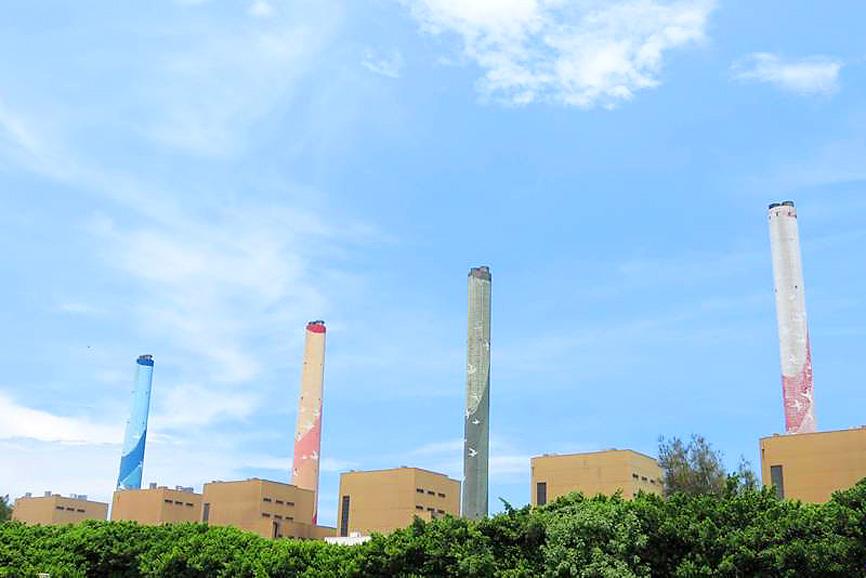Taiwan Power Co (Taipower, 台電) yesterday said that it would contest a NT$20 million (US$703,556) fine imposed by the Taichung City Government for restarting the Taichung Power Plant’s third coal-fired generator without obtaining its approval.
The city government has no grounds to issue the fine, the state-run utility said in a news release.
“Restarting the third coal-fired generator is completely legal, and its usage because of high electricity demand is completely within reason,” Taipower manager Chang Ting-shu (張廷抒) said.

Photo: Su Ching-feng, Taipei Times
“The city government’s attempt to issue such a fine is a waste of social and legal resources,” Chang added.
The Taichung City Government said that it fined Taipower for contravening the Air Pollution Control Act (空氣污染防制法), as it had already revoked the license for the generator.
“The Taichung City Government has overreached and twisted the law,” the Taipower release said. “They are allowing politics to override professionalism.”
The Environmental Protection Administration called on the Taichung City Government to “stop subverting the normal course of legal action,” and said that it would nullify the city government’s fine.
Taichung Mayor Lu Shiow-yen (盧秀燕) defended the city’s decision to fine Taipower as “fighting for the health of Taichung residents.”
“Our air pollution level has already reached the orange alert, yet Taipower would exacerbate our air pollution problem by starting the third coal-fired generator. It is regretful and shameful,” Lu said in a statement.

SEMICONDUCTORS: The German laser and plasma generator company will expand its local services as its specialized offerings support Taiwan’s semiconductor industries Trumpf SE + Co KG, a global leader in supplying laser technology and plasma generators used in chip production, is expanding its investments in Taiwan in an effort to deeply integrate into the global semiconductor supply chain in the pursuit of growth. The company, headquartered in Ditzingen, Germany, has invested significantly in a newly inaugurated regional technical center for plasma generators in Taoyuan, its latest expansion in Taiwan after being engaged in various industries for more than 25 years. The center, the first of its kind Trumpf built outside Germany, aims to serve customers from Taiwan, Japan, Southeast Asia and South Korea,

Gasoline and diesel prices at domestic fuel stations are to fall NT$0.2 per liter this week, down for a second consecutive week, CPC Corp, Taiwan (台灣中油) and Formosa Petrochemical Corp (台塑石化) announced yesterday. Effective today, gasoline prices at CPC and Formosa stations are to drop to NT$26.4, NT$27.9 and NT$29.9 per liter for 92, 95 and 98-octane unleaded gasoline respectively, the companies said in separate statements. The price of premium diesel is to fall to NT$24.8 per liter at CPC stations and NT$24.6 at Formosa pumps, they said. The price adjustments came even as international crude oil prices rose last week, as traders

Taiwan Semiconductor Manufacturing Co (TSMC, 台積電), which supplies advanced chips to Nvidia Corp and Apple Inc, yesterday reported NT$1.046 trillion (US$33.1 billion) in revenue for last quarter, driven by constantly strong demand for artificial intelligence (AI) chips, falling in the upper end of its forecast. Based on TSMC’s financial guidance, revenue would expand about 22 percent sequentially to the range from US$32.2 billion to US$33.4 billion during the final quarter of 2024, it told investors in October last year. Last year in total, revenue jumped 31.61 percent to NT$3.81 trillion, compared with NT$2.89 trillion generated in the year before, according to

SIZE MATTERS: TSMC started phasing out 8-inch wafer production last year, while Samsung is more aggressively retiring 8-inch capacity, TrendForce said Chipmakers are expected to raise prices of 8-inch wafers by up to 20 percent this year on concern over supply constraints as major contract chipmakers Taiwan Semiconductor Manufacturing Co (TSMC, 台積電) and Samsung Electronics Co gradually retire less advanced wafer capacity, TrendForce Corp (集邦科技) said yesterday. It is the first significant across-the-board price hike since a global semiconductor correction in 2023, the Taipei-based market researcher said in a report. Global 8-inch wafer capacity slid 0.3 percent year-on-year last year, although 8-inch wafer prices still hovered at relatively stable levels throughout the year, TrendForce said. The downward trend is expected to continue this year,